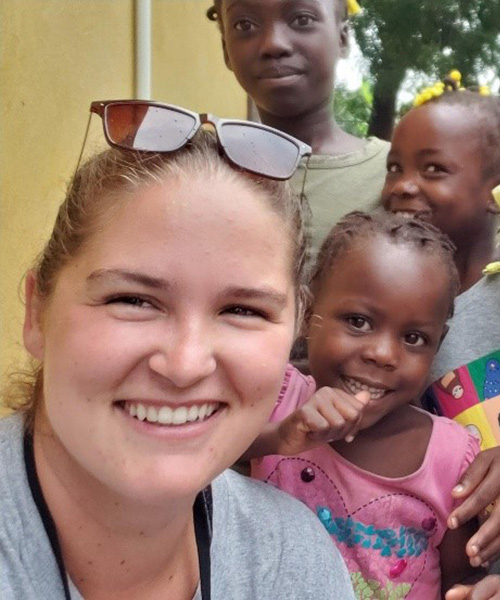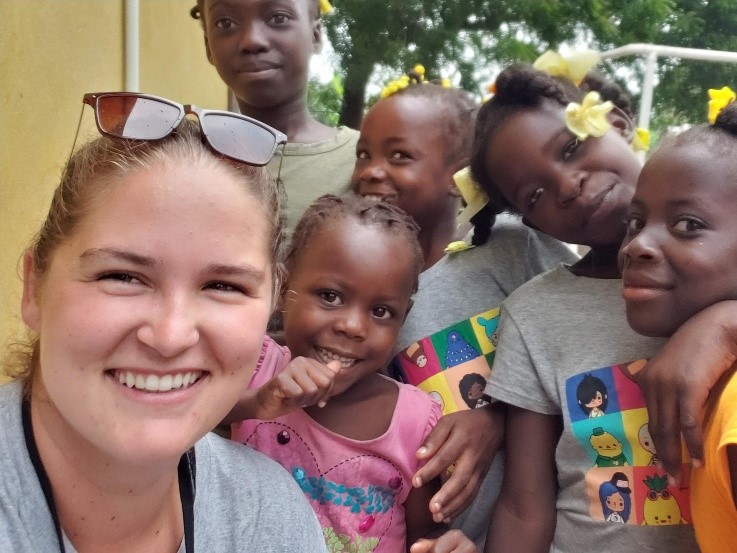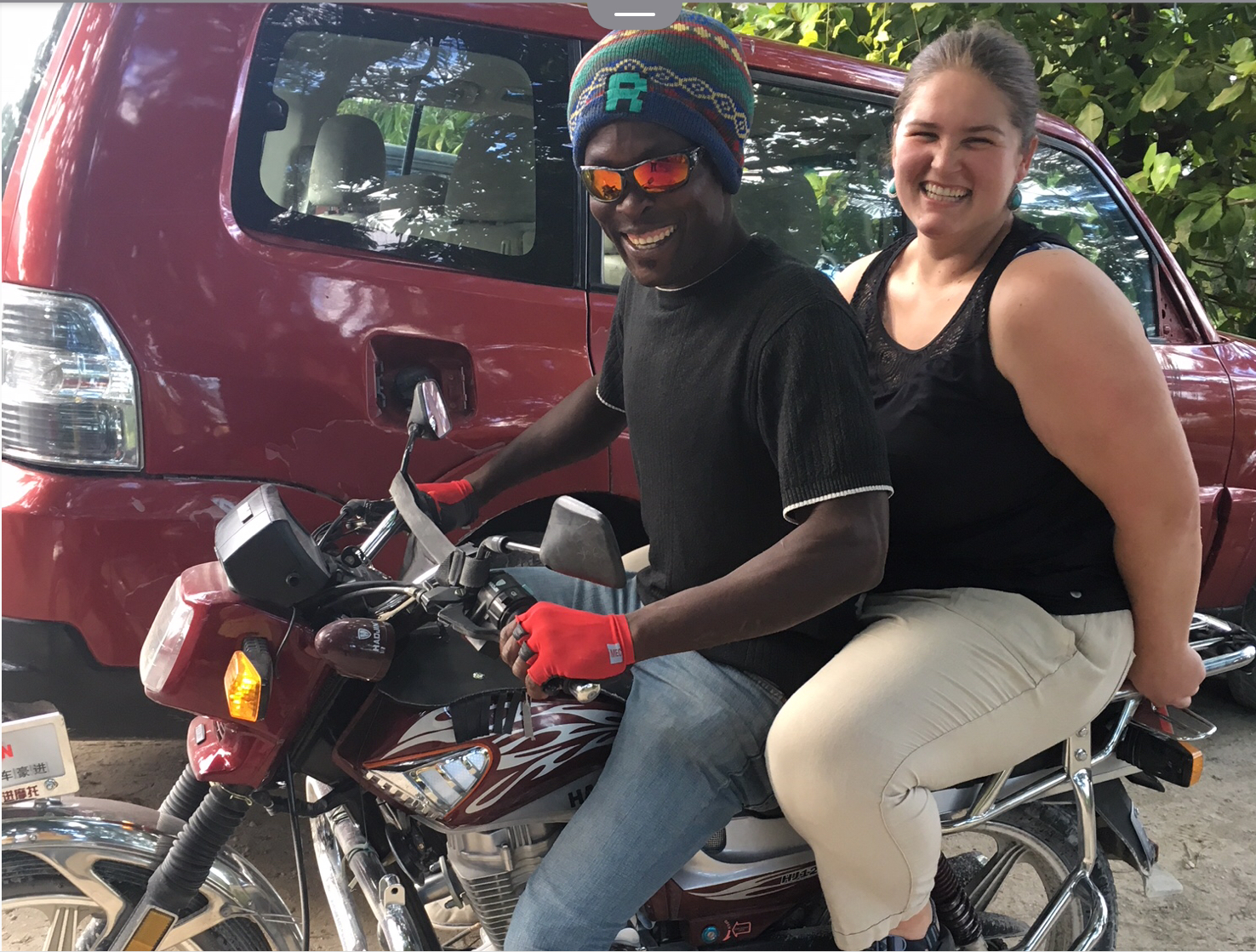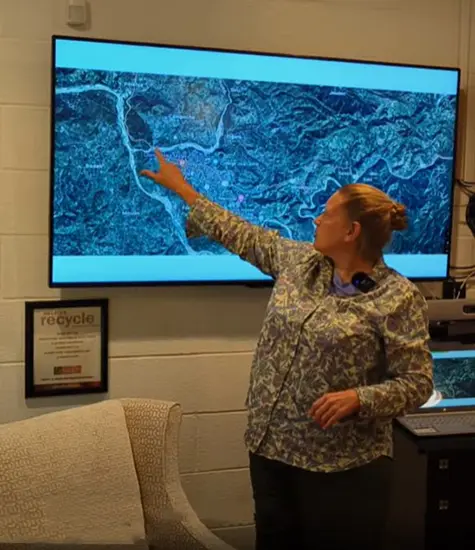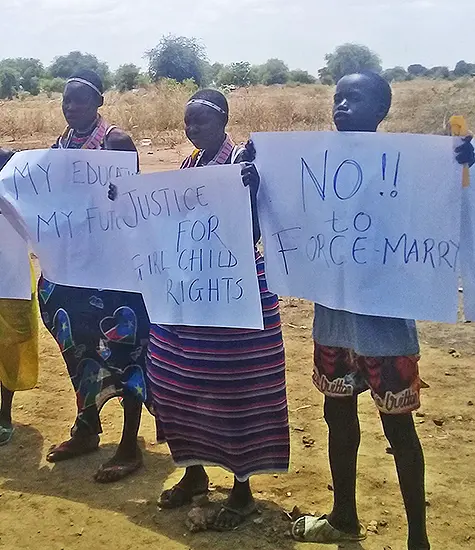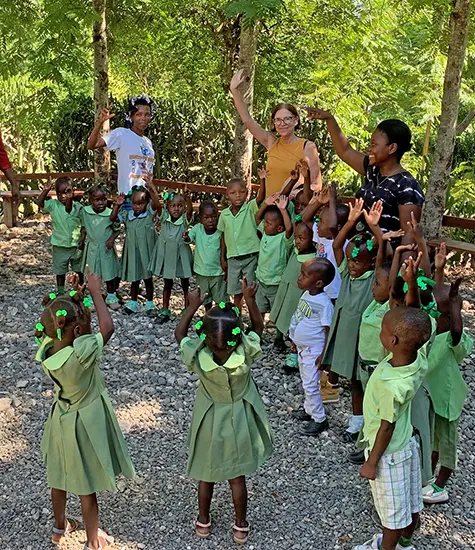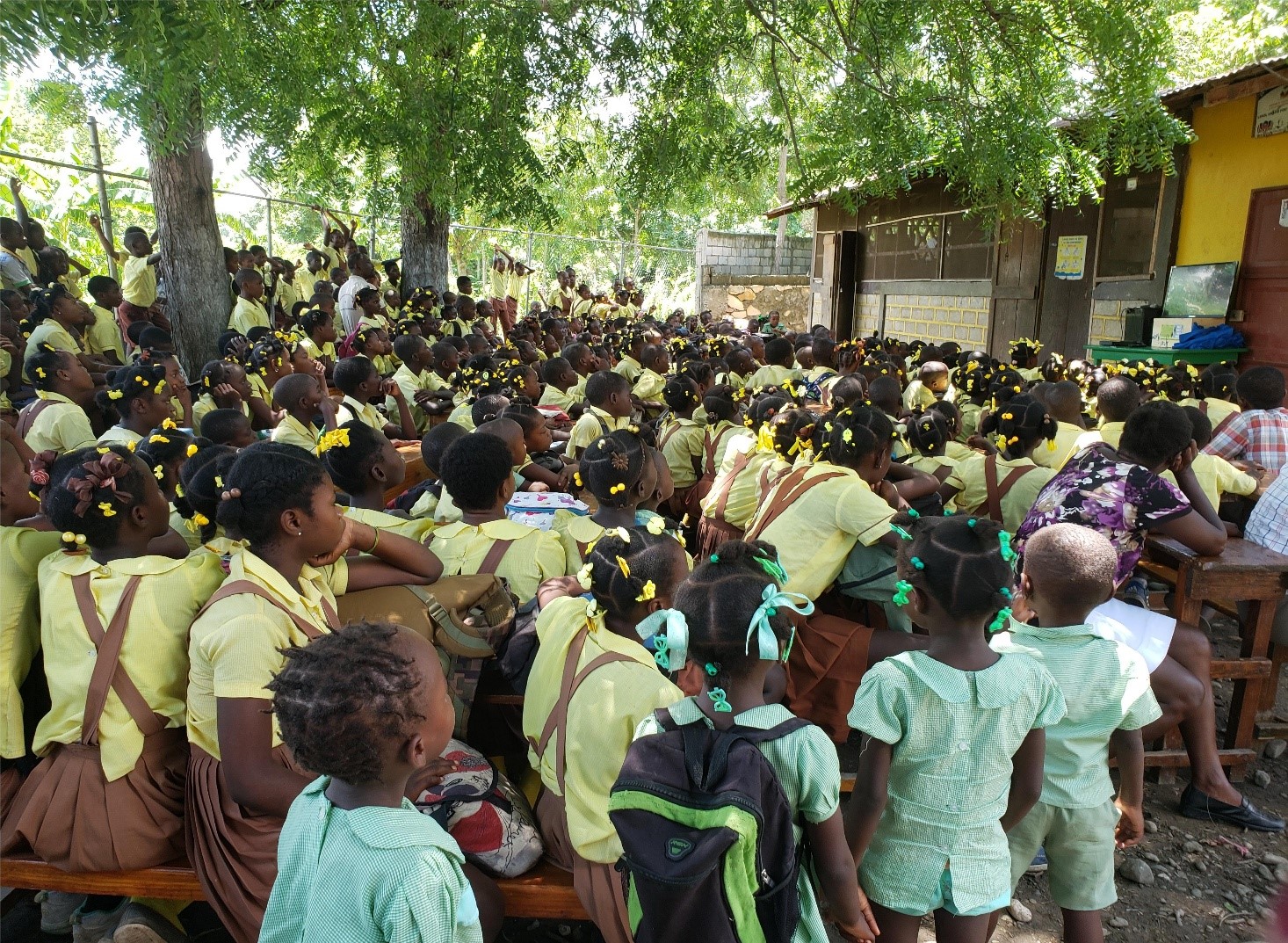
500 kids locked onto a documentary about Wangari Maathai and her Green Belt Movement–priceless!
Of the many beautiful things Haiti has taught me since opening her arms to me, the art of slowing down is for me a continuing lesson.
I walk the same 1.5-mile route to the school where my ministry is taking shape, sometimes four times a day. During my morning walk to school, I often spend time reflecting on things and asking God for guidance. It’s a bit of a jaunt, dodging motos (motorcycles), kamyons (big trucks) and the many women walking with enormous bundles on their heads to market. In the many moments when I wait for any of the three to pass, I’m afforded the chance to engage with someone, ask them how they are, and talk about whatever is going on around us.
It’s simple, but in this slowing down of things, I find little joys that I might have otherwise missed. I often end up walking the last part of the dirt road hand-in-hand with some of the 500 students that go to the school.
In our community of Gros Morne, we are surrounded by mountains on virtually all sides, which is refreshing when you come from a state flatter than a pancake (yes Dorothy, we’re not in Kansas anymore)! You can walk anywhere in town under an hour. The Jesus Mary School where I’ve been working is run by the Religious of Jesus and Mary Sisters and has many students who can’t afford education. The sisters provide these kids with a solid education.
Like with the rest of the country, many people live in poverty and struggle to find work. Education is the road for people to find a better life. The school provides a meal for the children after recess, and for many it is the only one they receive each day. Because the school takes care of some basic needs, the students are better able to focus on their education.
At school I work with different classes. I observe what the teachers do, recording notes on method, strategies and how the kids are responding. After the lessons, I talk with the instructors about what went well, what was difficult and what could be improved. We also discuss potential projects and what resources they require.
For instance, one of the first-grade teachers used an example of the students’ mothers cutting up an avocado or grapefruit to help give the kids a visual for understanding basic geometric principles in how shapes can be divided. A lot of light bulbs turned on as the kids who had been struggling made the connection.
Afterward we brainstormed ideas for how to bring even more discovery into the lesson. We’ll bring actual fruit into a similar lesson, and as a bonus, they’ll also get a nutritious and delicious snack! Continuing with the idea, we are planning to expand it into a science lesson and get the kids in the dirt to learn about planting and agriculture, using the seeds from their math snacks.
When the students work individually on math in their workbooks, I walk around the room to help or find ways to encourage and praise them. When it comes to their French lessons, let’s just say I do what I can to make them smile because, unlike them, I am so lost!
I love recess because it allows me to play games with the kids. For my first and second graders, tag—the kind where it’s all students vs. Abby—is their favorite, and man, do I get my workout! With my older students, I cheer on the boys as they play soccer and talk with the girls as they fuss with my hair or sunglasses or ask for pictures.
In the afternoons Monday through Wednesday, I come back to school after lunch to help with soccer. Fortunately, our main coach has actually played for the town’s team. We work with them on agilities and drills before we let them scrimmage.
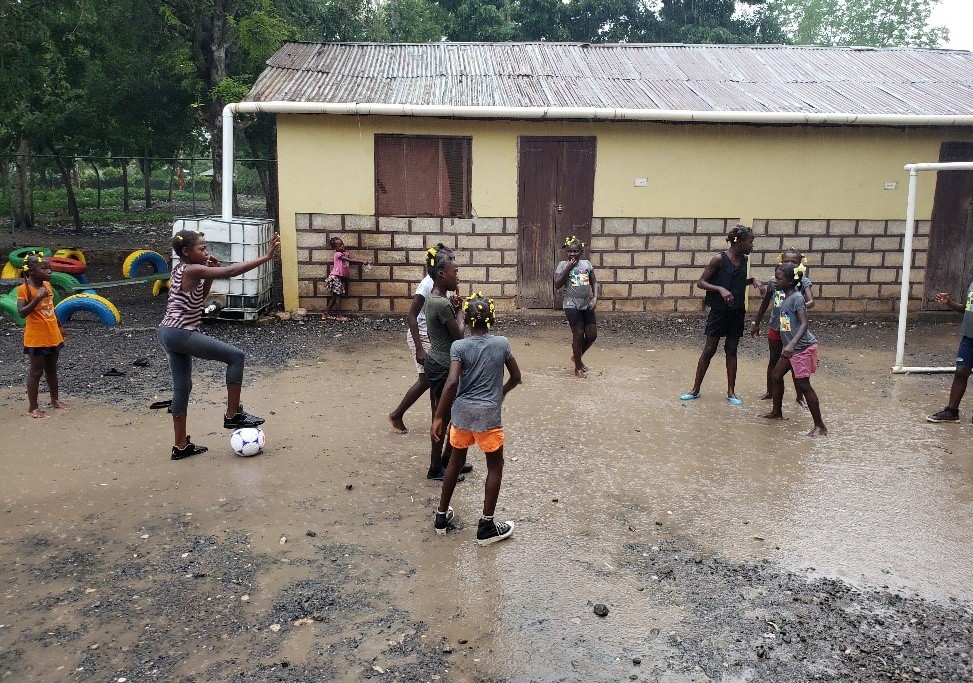
My girls asked if they could keep playing, even though it was raining oceans. I said, “Let’s do it!”
As part of my ministry here, I’m working on establishing a sports program between four of the schools here. I have locked in a donor deal with a sports facility in the U.S., which has agreed to donate resources for us to get this up and running. This project, however, is in its infancy and is teaching me the value of patience and slowing down. It is my hope that, working together with the school principals and coaches, we can have the schools start competing as early as next year.
One of the facets of this program is a “Second Chance” clause, which will allow students to come to practices (or music or art), even if they don’t have the grade (5.5 out of 10) they need for it. If they come to school on time, don’t have unexcused absences, and come to after-school tutoring twice a week, we give them a second chance. School is hard for a lot of kids, and that’s even without the difficult home life or hunger that many of our students face. Every child deserves to have things that make them happy and instill in them a sense of accomplishment, pride and love.
Another project I am excited to have us start in the fall will involve fifth graders drafting, writing and illustrating children’s books in Creole. I approached the teachers with this project because I noticed that the library had many more books in French and English than in the children’s native language. We want the kids to take pride in their language and culture, and this project will give them that opportunity. It also gives the big kids a chance to show off their story-telling and artistic skills. When the students finish their final drafts, they will get to share them with the younger grades. I can’t wait to see how this works.
Last week we had so much rain, even for the rainy season, and during the older boys’ practice, one started to lose the bottom of his shoe. Trying to make sure his foot was protected from the elements, I ran into the school storage room and grabbed bright orange “Gorilla Tape.” I had him sit down for a minute as I went to work, trying to mend his shoe. The other students and our coach, Sony, watched in mild amusement as the toe part of his shoe was being transformed into this bright orange point. He looked at me with curiosity and maybe a little doubt, but went right back to playing. Some 30 seconds later, he went to kick the ball, and with it went this lovely formed duct-tape impression of the toe part of his shoe and the sole, which had just completely come off.
Everyone erupted into laughter, Sony and I looked at each other and also broke out laughing. Our little trooper simply kicked off his shoes and went to work to help his team win the scrimmage.
That day I’d been questioning my efforts here. I just didn’t feel like I was contributing like I had thought I would. I had this idea that each day I would be able to “make a difference.” But what has been asked of me here in Haiti is much different, much less about my own ideas on how to fix the world.
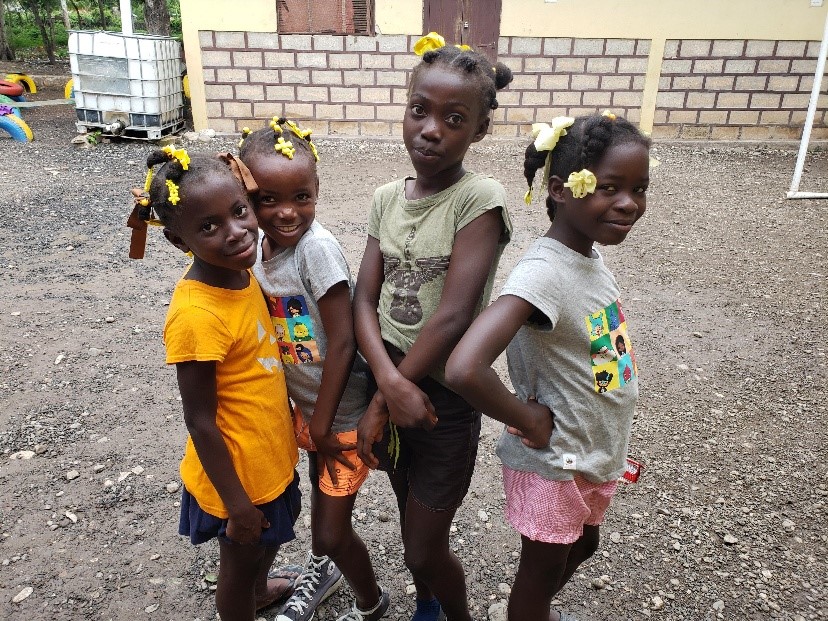 Humility is a necessary virtue, especially while living in a different land and culture. It’s not about me having it all figured out or rushing from one thing to the next, which my native culture counts for success and happiness. Haiti has been asking me to take a step back, slow down, look, listen, and learn. Seeing life through the Haitian culture is beautiful—of course not always, as is the case anywhere—and teaches me what it is to be human in a uniquely Haitian vision. How one life relates to another, how we serve one another as brother and sister, how we share in the pain and hurt as well as the joy and the love—we are, all of us, connected.
Humility is a necessary virtue, especially while living in a different land and culture. It’s not about me having it all figured out or rushing from one thing to the next, which my native culture counts for success and happiness. Haiti has been asking me to take a step back, slow down, look, listen, and learn. Seeing life through the Haitian culture is beautiful—of course not always, as is the case anywhere—and teaches me what it is to be human in a uniquely Haitian vision. How one life relates to another, how we serve one another as brother and sister, how we share in the pain and hurt as well as the joy and the love—we are, all of us, connected.
In the unbecoming of Abby—young woman who “had to have it all figured out to function”—I’ve been allowed to enter into the becoming of Abbagail—young woman who is learning to slow down and enjoy the journey to who God is asking me to be—and trust that I don’t have to have it all together all the time.
I have learned to take on spiders on my own, to take hold of an opportunity to sit down to eat with a friend, that soccer is absolutely more fun in the pouring rain (just ask my girls!), that there’s a certain freedom when you’re riding on the back of a moto as it zips through town, that there is no taste quite like a fresh mango, and that when love is invested, so too is life. And what an absolutely crazy, wonderful, chaotic, glorious life it is proving to be!
I still struggle every day at some point with the Creole language. It’s still frustrating for me to understand more than I can speak right now, but I have to remember to give myself grace. I am so grateful for the patience of the people here, who let me try a few times if I need to get out what I want to say. Haiti has gifted me with that reminder too: to give myself grace, the same as I would give any other human in my position.
Haiti is teaching me to love myself in ways I didn’t know I needed. In so doing, I am better able to love in return. To love better—this is the greatest gift, honor and lesson I could ever hope to pull from mission. And so I go on, in the discovery of new ways to love and live better with the time God has given me. I continue growing, struggling, rising, and discovering all the time. I am most richly blessed.
Abby Belt works at Jesus Mary School in Gros Morne, Haiti. She is one of two Maryknoll lay missioners in Haiti, where Maryknoll Lay Missioners began a new commitment in the fall of 2018.
All photos courtesy of Abby Belt.

